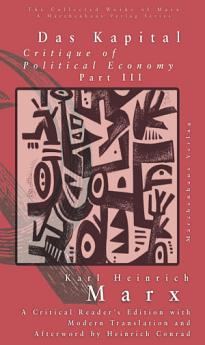Das Kapital: Critique of Political Economy (Part III)
About this ebook
Here the system of capital takes on its most mystified and seemingly autonomous shape, as profit appears severed from labor, and capital seems to generate value of its own accord. The movement through the trinity formula—capital-profit, land-rent, labor-wages—masks the origins of value and cloaks exploitation in the naturalized language of distribution. The reader is drawn into a structure of thought that unfolds with a rigorous internal logic, one that renders the contradictions of accumulation and crisis not as empirical accidents but as determinate forms of motion. In these final formulations, Marx’s categories move with a certain inevitability, animated by their own inner tensions, giving the appearance of a system that is both law-bound and yet riddled with immanent instability. The theoretical clarity of the work belies the spectral quality of its subject: a world governed by abstractions that live through concrete human relations, yet obscure them entirely.
This modern Critical Reader’s Edition includes an illuminating afterword tracing Marx’s intellectual relationships with revolutionary thinkers and philosophers (including Hegel, Feuerbach, Engels, and Ricardo), containing unique research into his ideological development and economic-metaphysical theories, a comprehensive timeline of his life and works, a glossary of Marxist terminology, and a detailed index of all of Marx’s writings. This professional translation renders Marx’s dense, dialectical prose into modern language to preserve the original force and precision of the text. Combined with the scholarly amplifying material, this edition is an indispensable exploration of Marx’s classic works and his enduring Hegelian-Protestant influence in the political, religious, economic, and philosophical spheres.










